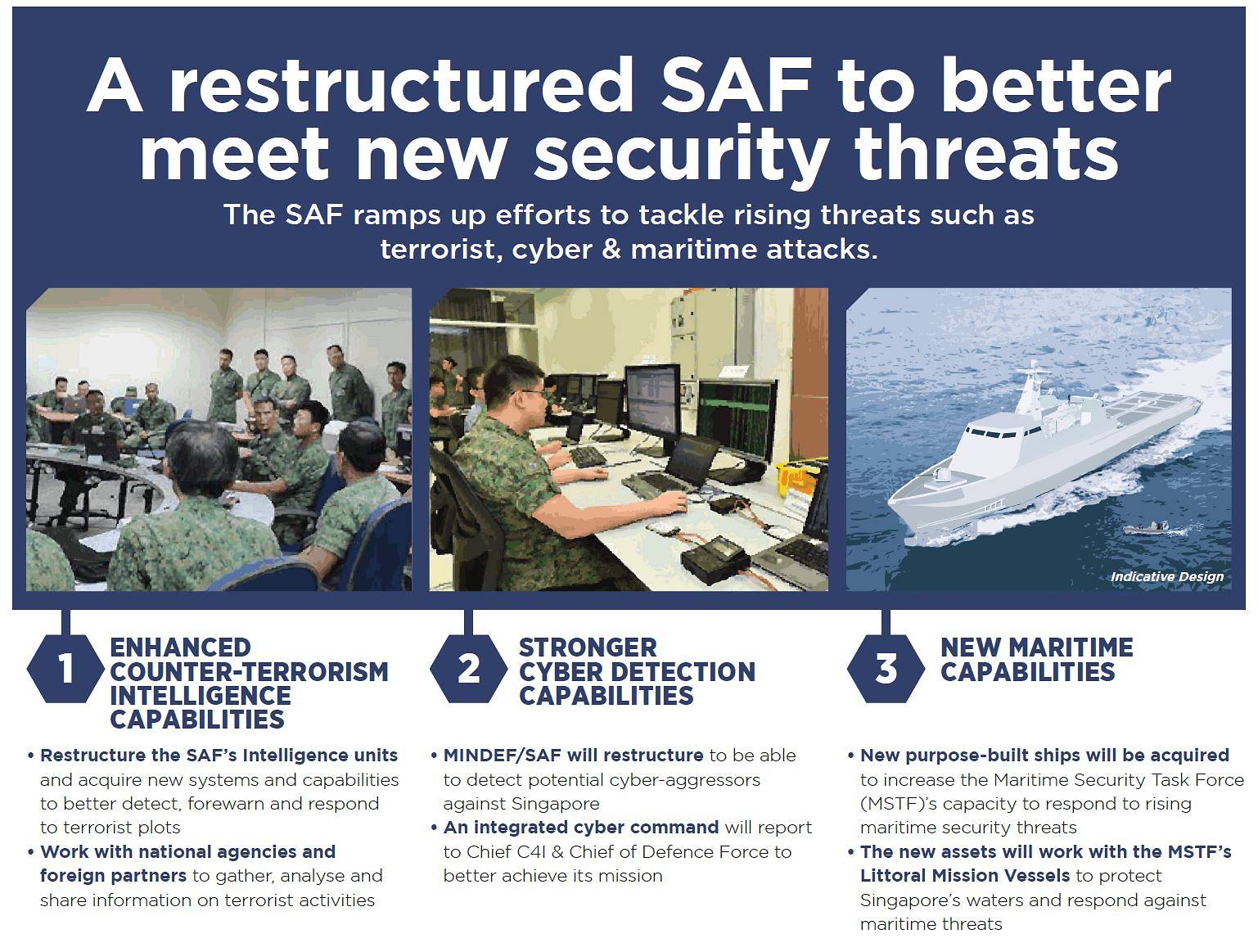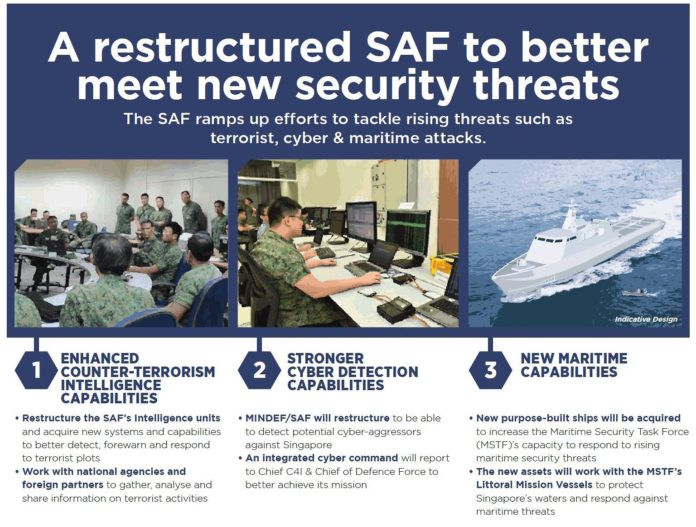SINGAPORE: The Singapore Armed Forces (SAF) will restructure its intelligence and cyber defence units as well as acquire new ships to boost maritime security, Defence Minister Ng Eng Hen said in Parliament on Monday (Mar 2).
This is in response to the clear and present security threats of terrorism, cyber and maritime threats, Dr Ng said in his Committee of Supply debate speech.
Along with the rest of the world, Singapore has entered into a different phase in geopolitics – messier, less predictable, and with therefore more unseen events, he said.
Dr Ng said China has become the world’s largest naval force, while the US has designated the Indo-Pacific as a priority theatre and characterised China as a “strategic competitor” and “rival power”.
Despite the challenges, Dr Ng said Singapore has forged even stronger defence relations with both countries, and must preserve its own space and sovereignty with the world at an “inflexion point”.
“Military spending in Asia has grown by more than 50 per cent in the last decade, with both China and India in the list of top five global spenders. ASEAN member states have doubled their spending on defence over the last 15 years,” he added.
“Willy-nilly, these events, conflated, have resulted in the Asia arena becoming more militarised and contested.”
Amid the changing geopolitics and a new environment of security challenges, Dr Ng said “the SAF must again restructure decisively to meet new challenges, to remain relevant, responsive, and effective for our national defence”.

The SAF is restructuring to better deal with evolving threats. (Graphic: MINDEF)
INTELLIGENCE
The SAF will restructure its Military Intelligence Organisation (MIO) to better detect, forewarn and respond to terrorist plots, Dr Ng said, highlighting this as a “key deliverable” for intelligence units even as they work with other agencies.
The restructured MIO will work with defence technology partners to acquire systems and capabilities that can uncover, investigate and monitor threat concerns, as well as strengthen its research and analysis expertise, the Ministry of Defence (MINDEF) said.
It will also work closely with other national agencies and cooperate with foreign military intelligence partners, both on a bilateral and multilateral basis. This includes formalised intelligence sharing with Brunei, Indonesia, Malaysia, the Philippines and Thailand under an intelligence pact launched in 2018.
“The terrorism threat to Singapore remains high,” MINDEF said, adding that Singapore has been a terrorist target in the past, most recently in 2016 for regional militants linked to the Islamic State of Iraq and Syria (ISIS).
“There is the threat of foreign terrorist fighters from conflict zones in the Middle East coming to the region, and introducing new attack methods and capabilities,” it stated. “The threat from home-grown, self-radicalised lone actors also cannot be ruled out.”
In 2016, authorities foiled a plot involving six suspected Indonesian militants to launch a rocket from Batam to Marina Bay after Indonesian police arrested the suspects in Batam.
Singapore’s Home Affairs Ministry stated that it had been aware of the plot and had been coordinating with Indonesian authorities.
CYBER DEFENCE
When it comes to cyber threats, MINDEF will restructure the Defence Cyber Organisation to improve detection of potential cyber-agressors against Singapore. Dr Ng said the process will take “some years” to complete.
The Chief of Defence Force (CDF) and Permanent Secretary (Defence Development) will lead a committee tasked with this effort, and oversee the development of an integrated cyber command and force to defend Singapore’s digital borders especially against foreign cyber actors.
“The SAF cyber command will have to provide threat assessments and early warning in cyber-attacks, and also respond accordingly,” MINDEF said, adding that it was “timely” to bring the command under the SAF
“For command integrity after the restructuring, CDF will continue to be in charge of mission outcomes, and the Chief C4I (Command, Control, Communications, Computers and Intelligence) will be the pinnacle position that holds accountability and reports directly to the CDF.”
The SAF has already taken steps to improve its cyber defence. In 2018, it launched a scheme to train full-time national servicemen to perform advanced cyber roles, like responding to incidents and testing for security weaknesses in IT hardware and software.
“The cyber domain is more difficult to plan and execute than in air, land and sea, and may require different types of units and force configuration,” Dr Ng said.
“The Committee intends to be bold in examining ways that we can address this challenge, but almost more important, to recruit soldiers of the right aptitude, training and deployments.”
MARITIME
In the maritime domain, the SAF will restructure its Maritime Security Task Force (MSTF) to better respond to the increasing maritime security threat in the Singapore Strait.
There were 31 suspected sea robbery incidents in the Singapore Strait in 2019, a four-year high according to an international maritime information sharing centre.
The restructuring includes the acquisition of new, purpose-built ships to be delivered in the next few years, MINDEF said, adding that four patrol vessels will be refurbished for this purpose in the interim.
“These ships will be dedicated and deployed for greater persistence to protect our territorial waters,” it stated.
“Together with the MSTF’s Littoral Mission Vessels, these new assets will enhance the MSTF’s capabilities to protect Singapore’s waters against intrusion and other maritime threats.”
MINDEF said the MSTF will continue to work closely with national agencies, like the Immigration and Checkpoints Authority and Maritime and Port Authority of Singapore, through the Singapore Maritime Crisis Centre, to safeguard Singapore’s waters.
Dr Ng said Singapore has reached out to Malaysia and Indonesia to propose extending the Malacca Straits Patrol initiative, where the countries share intelligence and conduct joint patrols in the Singapore Strait, to other areas in its surrounding waters.
“Maritime threats are transnational in nature and cannot be solved without co-operation and collaboration from our neighbours,” Dr Ng said, adding that discussions are ongoing.
Overall, the minister said the measures come as Singapore watches the changing geopolitics closely while pursuing its own interest.
“We have no desire to take sides or be caught in the crossfire,” he added. “So far, we have maintained independence and space for ourselves, but as contestation increases in this region, it will be increasingly difficult to do so.”





